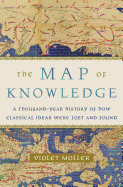
For centuries, the pursuit of knowledge has been revered. The Library of Alexandria, founded by Ptolemy I around 300 BC, was the center of scholarship in the ancient world. By 500 AD, the Roman Empire collapsed, cities retreated and the ascendant Christian Church had little interest in pagan knowledge. The Library of Alexandria fell into ruin, and innumerable texts vanished--but not all knowledge was lost.
In The Map of Knowledge, historian Violet Moller examines how classical ideas from ancient Greece survived the Dark Ages--the 1,000-year period between the fall of the Roman Empire and the dawn of the Enlightenment. Moller focuses on Euclid's Elements (mathematics), Ptolemy's Almagest (astronomy) and the work of Galen, whose writings on medicine were so large they account for half of the surviving literature from ancient Greece. Over the millennia, six cities were instrumental in the preservation and transmission of knowledge: scholars in Baghdad laid the foundation for the scientific method, and Arabic translations of Greek texts flourished in the Iberian cities Córdoba and Toledo under Arab control. New trade routes and powerful leaders in Salerno and Palermo provided for the Latin translations of important texts that were disseminated throughout Europe. By the end of the 15th century, Venice became the center of intellectual life, and the newly invented printing press allowed for classical texts to be published broadly in vernacular languages.
Thanks to these politically stable and tolerant cities, scribes and scholars kept classical ideas alive for the great thinkers of the Enlightenment. Often ignored, the scholarship of the Middle Ages gets its rightful place in history thanks to Moller. --Frank Brasile, librarian

